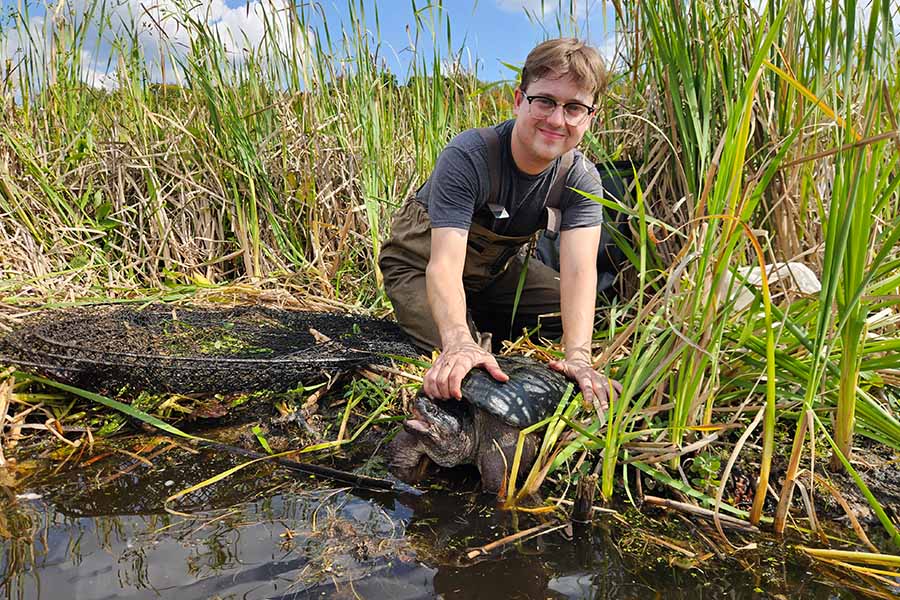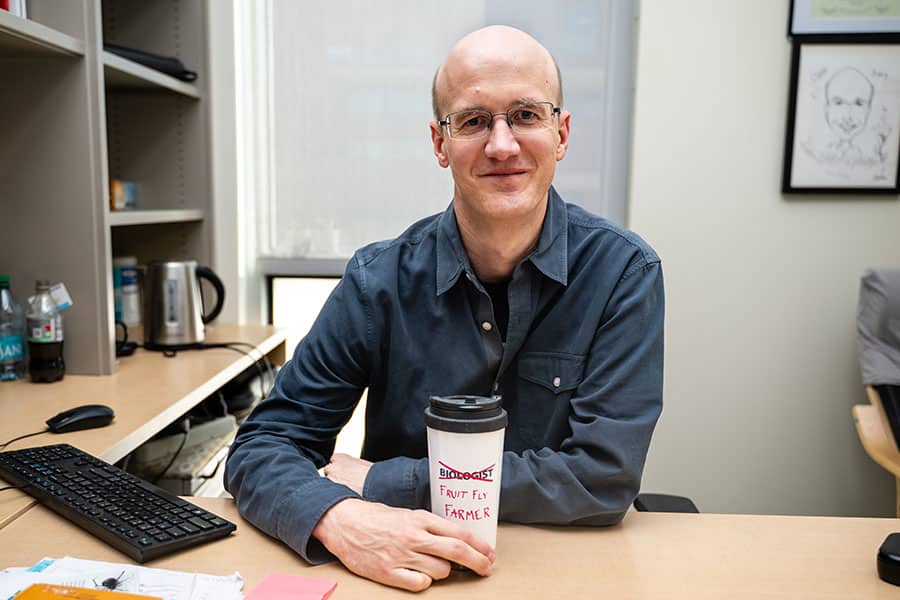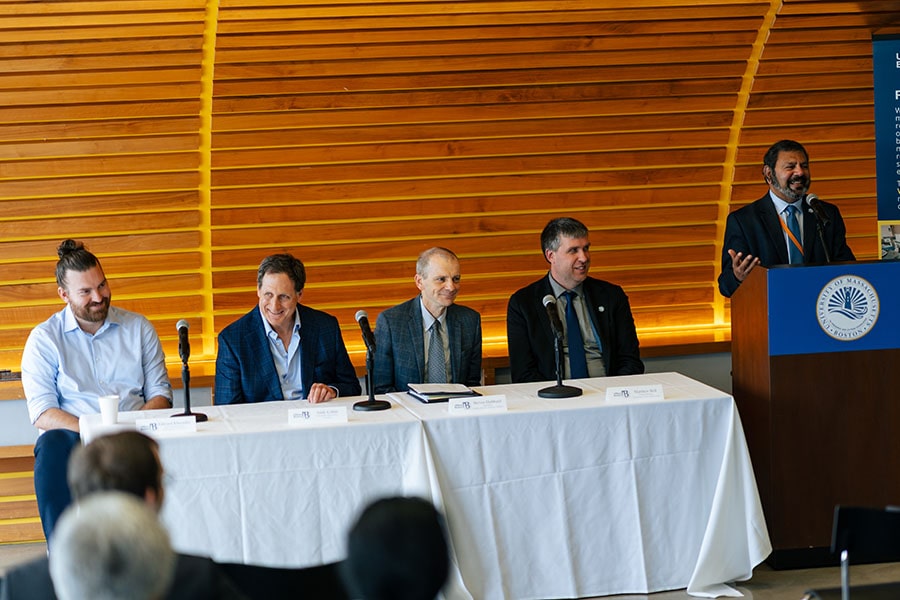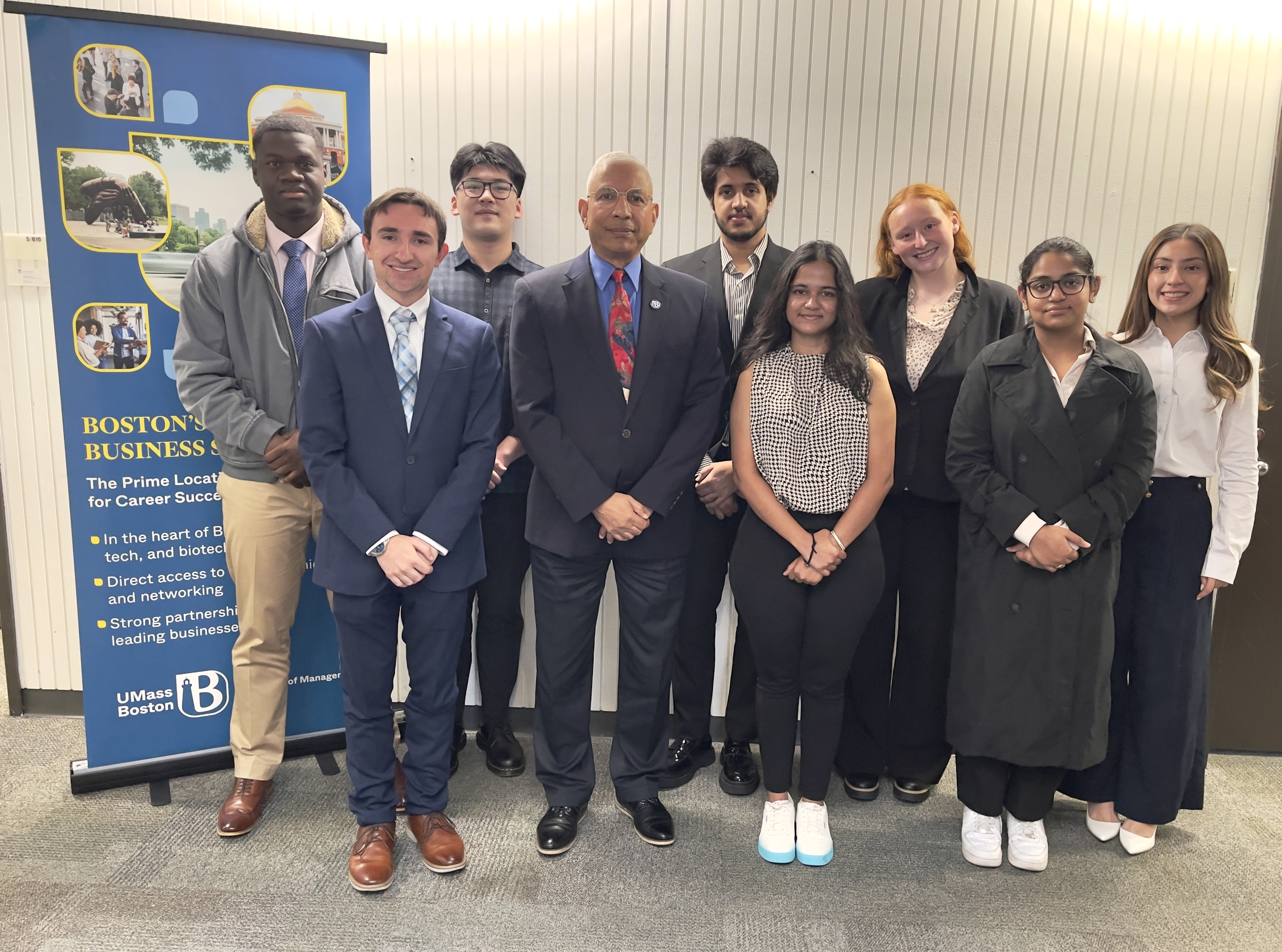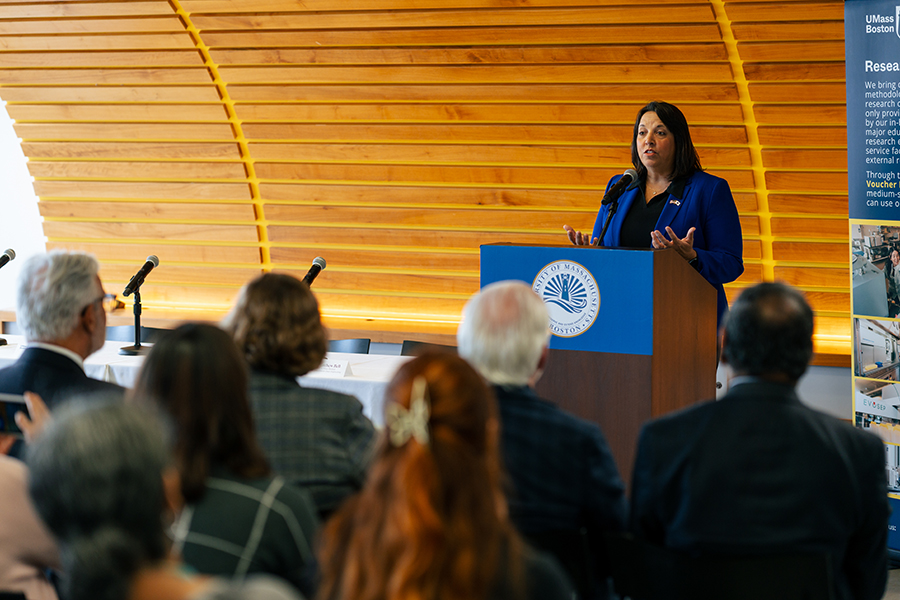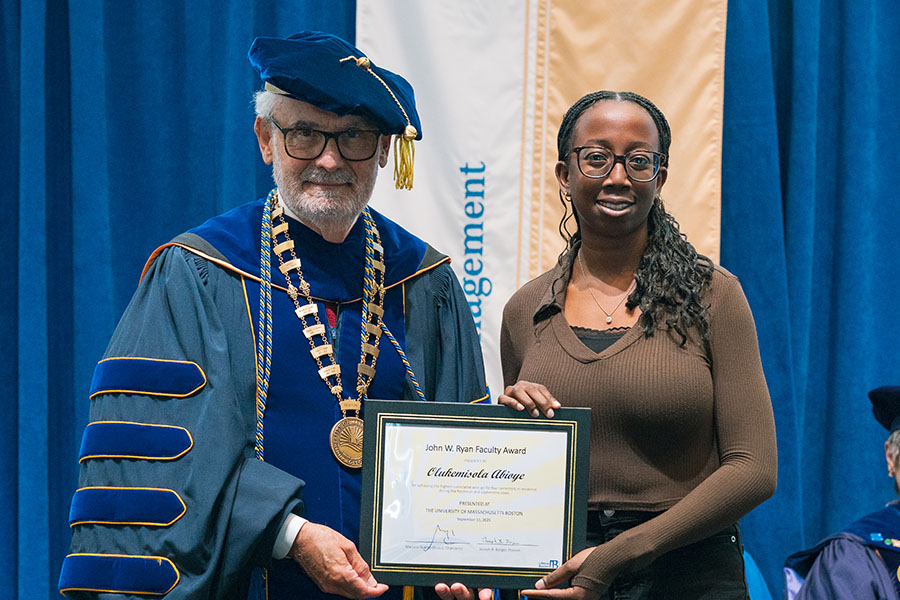Harvard Professor Khalil Muhammad’s 2023 Slomoff Lecture Invites McCormack Students to Learn Outside the Classroom
Part of a student’s well-rounded education in programs at the McCormack School includes a balance of time in the classroom and time out of the classroom, through fieldwork, research, fellowships, and public events. Each is regarded as a distinct opportunity for learning. The Benjamin and Sylvia Slomoff and Judith Green Loose Lectureship in Conflict Resolution series, hosted annually by the Department of Conflict Resolution, Human Security, and Global Governance at the McCormack School, is one platform for students to learn outside of the classroom from people working in the field, often with high stature and reputation.
Named in honor of Ben Slomoff, a McCormack alum who, among other things, is remembered for his lifelong commitment to learning—completing his master’s degree in conflict resolution well into his 80s—the Slomoff Lectureship in Conflict Resolution series has hosted names such as Herbert Kelman, Christiana Figueres, and Senator George Mitchell. The Slomoff Lectureship is comprised of donations from the Slomoff family and friends to support the costs related to the annual lecture, which typically include travel, honoraria, and catering and post-lecture dinner costs. The Slomoff family and friends have helped bring thinkers in mediation, international relations, diplomacy, and dispute resolution to the UMass Boston campus since its inaugural annual event in 2000.
An alumnus of the university, Slomoff came to UMass Boston following retirement from his career in the shoe industry. He graduated with a bachelor’s degree in 1993, followed by a graduate certificate and then master’s degree in 1997. For the UMass Boston community, Slomoff represents an investment in and lifelong commitment to learning. As interim Dean Rita Kiki Edozie explained, Slomoff’s story reminds UMass Boston students that “Education is a lifelong pursuit. These are the values that we recognize at the McCormack School of Policy and Global Studies.”
This year’s lectureship, in April, hosted Dr. Khalil Gibran Muhammad, Ford Foundation Professor of History, Race, and Public Policy at the Harvard Kennedy School. As Dr. Karen Ross mentioned in her opening remarks, Dr. Muhammad joined a distinguished roster of Slomoff lecturers. In a recent interview, Ross, Director of Graduate Programs in Conflict Resolution within the Department of Conflict Resolution, Human Security and Global Governance, explained, “Our goal is to invite a speaker who is doing impactful work in the public sphere. One of our considerations has been to emphasize issues related to equity and addressing structural injustices. Dr. Muhammad’s work right now felt like an important fit.”
During the lecture, Muhammad spoke on “The Truth About Truth Telling and Racial Justice: Field Notes from Northern Ireland, Rwanda, and South Africa.” Approaching the role that the United States plays in policing pathways to transitional justice, reconciliation, and conflict resolution in countries around the world with a critical lens, Dr. Muhammad shared field notes from his travels across several countries as part of a research team supported by the W.K. Kellogg Foundation.
As he explained in his talk, “The broad contours of this research are interested in the relationships that come with truth-telling. We’re interested in [how] the degree to which the past is described, remembered, and documented forms a memorialization—that is, the ways in which the public is made aware of these pasts.” In other words, his lecture asked, “How do we address systemic power?”
In his talk, Dr. Muhammad examined Northern Ireland, with attention to the unresolved trauma of the Troubles that began in the 1960s; Rwanda, where the post-World War I transfer of power from the Germans to the Belgians created conflicts in the country that led to the genocide of the Tutsi people in 1994; and South Africa, a country which has not eradicated racial conflict and segregation even decades after the dissolution of apartheid in the 1990s.
In each of these nations, Muhammad’s research team was interested in how colonialism has laid the foundation for areas of conflict and, from a policy perspective, what levers had been used to address how to make sense of the past in order to move forward. Muhammad began with an explanation of the typical process of truth-telling, from a conflict resolution view. First, human rights violations are addressed and investigated. Second, victims tell their stories and recount their past abuses. Third, dialogue is fostered to dispel distorted depictions of the past through reconciliation. Finally, policy recommendations are made based on the victims’ truth-telling. Throughout his talk, Muhammad addressed how the truth-telling process in each of the three countries aligned with this typical framework, highlighting in particular where they diverged from it.
Drawing from these three examples, Muhammad offered perspective on the recently proposed legislation by Congresswoman Barbara Lee and Senator Cory Booker to establish a United States Commission on Truth, Racial Healing, and Transformation not unlike the truth-telling efforts in Northern Ireland, Rwanda, and South Africa. “If there is a pathway to taking lessons from this period,” Muhammad explained, “that pathway runs through truth-telling [and] coming up with a shared narrative of what happened in the past and a new memorialization culture that would replace the existing one.”
As he positioned his field observations as lessons from which the United States could learn, Muhammad ultimately concluded that “There’s no pathway to justice and a lasting peace that doesn’t start with truth.” The conflict resolution method of truth-telling, and each of its incumbent processes, must be at the forefront for a United States Commission on Truth, Muhammad argued. Drawing from his research experiences, Muhammad cautioned that “The truth about truth-telling is that it’s hard. We don’t have a perfect model in the world about how to do it,” but as we hand these countries off to future generations, he argued, it is important to take the best of what we have seen from various conflict areas such as Northern Ireland, Rwanda, and South Africa and learn from their mistakes.
Reflecting on the importance of a lectureship that provides inside expertise into this timely and significant work, Dr. Karen Ross explained, “This is a public-facing event that is intended to provide opportunities for learning outside of the classroom. The lectureship series is an opportunity for us to bring to UMass Boston individuals who’ve had a significant impact on policy processes.”
For Ross, the Slomoff Lectureship offered by Dr. Muhammad is positioned well within questions among conflict resolution scholars about how to best serve their field. As she explained, to bring multiple perspectives to the table is not unique within the field of conflict resolution, but a growing concern has been attending to power imbalances at play within group dynamics. As Ross commented, “The faculty have a lot of conversations about what it means for us to be doing conflict resolution. There’s power imbalances, structural inequities, and issues that go far beyond group dynamics. Addressing those things is core within the field.” She noted that Dr. Muhammad’s lecture fit well within these growing concerns in the field of conflict resolution and within contemporary United States policy efforts to account for its complicity in the transatlantic slave trade and ongoing systemic racism.
For students of conflict resolution at McCormack, the learning was not limited to Muhammad’s lecture. The department also organized a pre-lecture informal conversation between Dr. Muhammad and students in the programs, giving them a chance to ask questions about conflict resolution as it relates to Dr. Muhammad’s work. As Ross noted, this conversation presented students with an opportunity to hear about policy work from a more macro level through a firsthand account. “It’s not a total departure from the conversations we have in classes,” she said, “but it is a shift in terms of who they’re hearing from and what they can learn from them.”
Moments like this are reminders of the educational quality of the department’s programs, which are taught by scholar-practitioners with one foot in the field and one in the academy, along with the varied educational opportunities that the programs invite students into.
At the same time, the department invites the public in. Although the Slomoff Lectureship is an annual series, it is housed as one of the department’s monthly public lectureships, which open their doors to students, alumni, and the greater Boston public. Ross commented, “The lectures serve the purpose of providing the UMass Boston community or the Boston community more broadly an opportunity to learn about engaged work in policy and practice around conflict resolution, peacebuilding, and diplomacy.” As she explained, “This serves both the McCormack mission and our own public education mission within our department.”
Latest University News
- Biology Team to Survey Reptiles and Amphibians in National Parks with $190K NPS Cooperative AgreementProfessors of Biology Rob Stevenson and Doug Woodhams, from the College of Science and Mathematics, have received a two-year award for $190,000 from the Department of the Interior’s National Park Service to develop a comprehensive survey of reptiles and amphibians in participating parks.
- In Fruit Fly Eyes, UMass Boston Researcher Sees Potential Medical DiscoveriesJens Rister, an associate professor in UMass Boston’s biology department, has just been awarded more than $1,700,000 in funding from the National Eye Institute of the NIH to research a protein that guides the development of color vision in fruit flies. By learning more about the underlying mechanisms, Rister hopes to learn about human diseases such as Oculoauricular Syndrome, a genetic condition that affects eyes and ears.
- Quantum Experts Discuss Impact of Investment on Students, Science and BusinessesFollowing the announcement that UMass Boston will be receiving a $3.8M grant to develop and commercialize quantum hardware, expert panelists discussed the positive impact that investment in quantum research can have.
- College of Management Welcomes a Global Cohort of Dean’s Student AmbassadorsThe College of Management at the UMass Boston is proud to announce its newest cohort of Dean’s Student Ambassadors–an extraordinary group of undergraduate leaders who will represent the College throughout the 2025-2026 academic year.
- UMass Boston Secures $3.8M for Collaborative Expanding Quantum Hardware Development, CommercializationMassTech Builds on its Support of UMass Boston, Western New England University-led Initiative
- Olukemisola “Kemi” Abioye has been recognized as the 2025 Ryan Award winner after achieving the highest cumulative GPA over four semestersAfter years of hard work and learning to balance extracurriculars with jobs, internships, and school, Kemi Abioye received the 2025 Ryan Award at UMass Boston.








